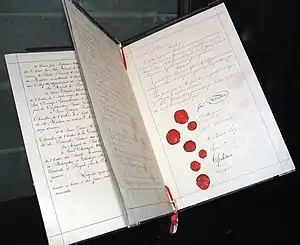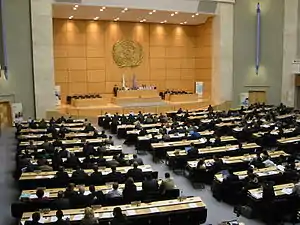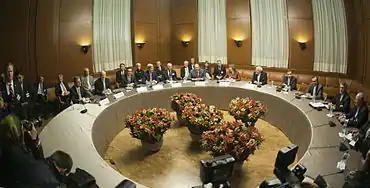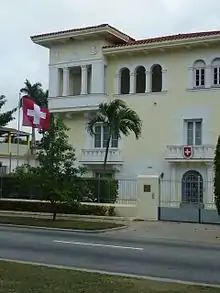Foreign relations of Switzerland
The foreign relations of Switzerland are the primary responsibility of the Federal Department of Foreign Affairs (FDFA). Some international relations of Switzerland are handled by other departments of the federal administration of Switzerland.
.svg.png.webp) |
|---|
| This article is part of a series on the politics and government of Switzerland |
|
|
History

Article 54 of the Swiss Constitution of 1999 declares the safeguarding of Switzerland's independence and welfare as the principle objective of Swiss foreign policy. Below this overarching goal, the Constitution specifies these foreign policy objectives:
- alleviate need and poverty in the world;
- promote respect for human rights and democracy;
- promote the peaceful coexistence of peoples;
- promote preservation of natural resources.
These objectives reflect the Swiss moral obligation to undertake social, economic, and humanitarian activities that contribute to world peace and prosperity. This is manifested by Swiss bilateral and multilateral diplomatic activity, assistance to developing countries, and support for the extension of international law, particularly humanitarian law.
Traditionally, Switzerland has avoided alliances that might entail military, political, or direct economic action. Only in recent years have the Swiss broadened the scope of activities in which they feel able to participate without compromising their neutrality. Switzerland is not a member of the European Union and joined the United Nations very late compared to its European neighbours.
Switzerland maintains diplomatic relations with almost all countries and historically has served as a neutral intermediary and host to major international treaty conferences. The country has no major dispute in its bilateral relations.
Switzerland (mainly Geneva) is home to many international governmental and nongovernmental organisations, including the International Committee of the Red Cross. One of the first international organisations, the Universal Postal Union, is located in Bern.
United Nations

On 10 September 2002, Switzerland became a full member of the United Nations, after a referendum supporting full membership won in a close vote six months earlier; Swiss voters had rejected membership by a 3-to-1 margin in 1986. The 2002 vote made Switzerland the first country to join based on a popular vote.
Prior to its formal accession to the United Nations, Switzerland had maintained an observer role at the UN's General Assembly and its Economic and Social Council. Prior to full membership it had no right to a seat as one of the elected members of the UN Security Council.
Switzerland has fully participated within many of the UN's specialised institutions, including the Economic Commission for Europe, United Nations Environment Programme, the UN High Commissioner for Refugees, UN Educational, Scientific and Cultural Organization, UN Conference on Trade and Development, UN Industrial Development Organization, and the Universal Postal Union. Switzerland has also furnished military observers and medical teams to several UN operations.
Switzerland is a party to the Statute of the International Court of Justice.
Support of UN sanctions
The Swiss government on 25 June 2003, eased most of the sanctions against the Republic of Iraq in accord with UN Security Council Resolution (UNSCR) 1483. The government lifted the trade embargo, flight restrictions, and financial sanctions in place since August 1990. The weapons embargo and the asset freeze, the scope of which was extended, remain in force, and restrictions on the trade in Iraqi cultural goods were newly imposed. Though not a member at the time, Switzerland had joined UN sanctions against Iraq after the invasion of Kuwait.
Switzerland also has joined UN economic sanctions imposed on Libya, Sierra Leone, UNITA (Angola), Liberia, and Serbia/Montenegro. On 15 October 2003, the Federal Council ended the import restrictions on raw diamonds from Sierra Leone and lifted sanctions against Libya.
Switzerland in October 2000 implemented an ordinance to enforce UN sanctions against the Taliban (UNSCR 1267), which it subsequently amended in April 2001 in accord with tighter UN regulations (UNSCR 1333). On 2 May 2002, the Swiss Government eased the sanctions regime in accord with UNSCR 1388 and 1390, lifting the ban on the sale of acetic acid (used in drug production), Afghan airlines, and Afghan diplomatic representations. The weapons embargo, travel restrictions, and financial sanctions remain in force.
The Swiss Government in November 2001 issued an ordinance declaring illegal the terrorist organisation Al-Qaeda as well as possible successor or supporting organisations. More than 200 individuals or companies linked to international terrorism have been blacklisted to have their assets frozen. Thus far, Swiss authorities have blocked about 72 accounts totalling U.S.$22.6 million.
EU and other international organizations
Switzerland and Denmark signed a treaty of Friendship in 1875.
Switzerland is a member of many international organisations, including the World Trade Organization, Organisation for Economic Co-operation and Development, European Free Trade Association, Council of Europe, Organization for Security and Cooperation in Europe, International Atomic Energy Agency, and International Telecommunications Satellite Organization. Its central bank is a member of the Bank for International Settlements, based in Basel.
Switzerland is an active participant in the Organization for Security and Co-operation in Europe, its foreign minister serving as Chairman-in-Office for 1996. Switzerland also is an active participant in the major nonproliferation and export control regimes.
Although it is surrounded by member nations, Switzerland is not a member nation of the European Union. In 1992 Swiss voters approved membership in the International Monetary Fund and the World Bank, but later that year rejected the European Economic Area agreement, which the government viewed as a first step toward European Union membership. The Swiss instead take part in the European single market and Schengen through bilateral treaties.
ACCT, AfDB, AsDB, Australia Group, BIS, CE, CERN, CGPM, EAPC, EBRD, ECE, EFTA, ESA, FAO, G-10, IADB, IAEA, IBRD (World Bank), ICAO, ICC, ICC, ICDO, ICFTU, ICMM, ICRM, IDA, IEA, IFAD, IFC, IFCS, IFRCS, IGC, ILO, IMF, IMO, Inmarsat, Intelsat, Interpol, IOC, IOM, ISO, ITU, IWC, LAIA (observer), NAM (guest), NEA, NSG, OAS (observer), OECD, OIE, OPCW, OSCE, OTIF, PCA, PFP, UNCTAD, UNESCO, UNHCR, UNIDO, UNITAR, UNMIBH, UNMIK, UNMOP, UNOMIG, UNTSO, UNU, UPU, WCL, WCO, WHO, WIPO, WMO, WToO, WTrO, ZC.
Participation in peacekeeping
While the Swiss electorate did reject a government proposition to directly deploy Swiss troops as UN peacekeepers (the Blue Helmets) in 1994, a total of 23 Swiss personnel including police and military observers (the Blue Berets) have served or are now serving for the United Nations. These dispositions are impartial, clearly defined and cover a number of UN projects around the globe.[2]
In 1996 Switzerland joined NATO's Partnership for Peace, the Euro-Atlantic Partnership Council in 1997, and deployed Yellow Berets to support the OSCE in Bosnia. In June 2001, Swiss voters approved new legislation providing for the deployment of armed Swiss troops for international peacekeeping missions under UN or OSCE auspices as well as closer international cooperation in military training.
Since 1999, the Swiss army is participating through SWISSCOY in the peace keeping mission of the Kosovo Force (KFOR) based on UN-resolution 1244, with prolonged presence until 2014, after approval by the Swiss federal assembly in Spring 2011. Main duties include the supervision of civilian reconstruction efforts, monitoring and protection of patrimonial sites, military police and medical assistance.[3]
Representation of foreign entities and in foreign disputes

Switzerland also represented Cuba in the United States between 1991 and 2015.[4]
Under a series of treaties concluded after the First World War, Switzerland assumed responsibility for the diplomatic and consular representation of Liechtenstein, the protection of its borders, and the rulation of its customs.
Due to its long-standing neutrality, Switzerland has served as the protecting power for many countries, that did not have diplomatic relations with each other. This reached an apex during the Second World War, when Switzerland formally undertook 219 mandates for 35 states, and represented another eight states unofficially[5] After the Second World War, Switzerland served an additional 67 mandates for various countries, including those between Cuba and other nations in the Western Hemisphere after the 1959 Cuban Revolution, between Middle Eastern nations following the outbreak of the Yom Kippur War in 1973, and between India and Pakistan prior to the formalization of relations in 1976.
Today, Switzerland has seven protecting power mandates:
- United States interests in both Cuba (until 2015) and Iran
- Cuban interest in the United States (until 2015)
- Iranian interests in both Canada and Egypt
- Saudi Arabian and Iranian interests with each other
- Georgian and Russian interests with each other
Switzerland played a key role in brokering a truce agreement between the Sudanese Government and Sudan People's Liberation Army for the Nuba Mountains region, signed after a week's negotiations taking place near Lucerne in January 2002. Switzerland has also sent services to allied troops in the War in Afghanistan.[6]
Switzerland is also playing a major role in Palestinian politics, trying to act as a mediator between Fatah and Hamas regarding the integration of employees in Gaza. The Swiss diplomatic efforts lead to an agreement called "the Swiss Document" which initially was approved by both Palestinian parties.[7]
Diplomatic representations
- Diplomatic representations of Switzerland: Official list
- Diplomatic representations in Switzerland: Official list
Bilateral relations
Africa
| Country | Formal Relations Began | Notes |
|---|---|---|
| ||
| 1967 |
Both countries established diplomatic relations in 1967.[8] | |
| 1980 |
Both countries established diplomatic relations in 1980.[9] | |
| 1977 |
| |
See Egypt–Switzerland relations
| ||
| 1968 |
Both countries established diplomatic relations in 1968.[11] | |
| ||
See Kenya–Switzerland relations
| ||
| 1967 |
Both countries established diplomatic relations in 1967.[12] | |
| ||
| ||
| ||
| ||
| ||
See South Africa–Switzerland relations
| ||
| 1980 |
Both countries established diplomatic relations in 1980.[16] |
Americas
| Country | Formal Relations Began | Notes |
|---|---|---|
| 1834 | See Argentina–Switzerland relations
Diplomatic relations were established in 1834, with the opening of a Swiss consulate in Buenos Aires, followed in 1891 by the opening of an embassy.
| |
| 1988 |
| |
| ||
| 1945 | See Canada–Switzerland relations | |
| ||
| ||
| ||
 Embassy of Switzerland in Havana
| ||
| 1841 |
| |
| ||
| 1804 |
| |
| 1827 | See Mexico–Switzerland relations
| |
| 1956 |
| |
| ||
| 1992 |
Both countries established diplomatic relations in 1992.[18] | |
| 1985 |
Both countries established consular relations in 1985 and diplomatic relations in 2001.[19] | |
| 1979 | See Suriname–Switzerland relations
Both countries established diplomatic relations in 1979.[20] | |
| 1853 | See Switzerland–United States relations
The first official U.S.-Swiss consular relations were established in the late 1820s. Diplomatic relations were established in 1853 by the U.S. and in 1868 by Switzerland. The U.S. ambassador to Switzerland is also accredited to the Principality of Liechtenstein.
| |
| 1828 | See Switzerland–Uruguay relations
Both countries share a long history of mutual economic relations, and they established diplomatic relations in 1828.[21][22] Uruguay became a popular destination for Swiss migrants starting in the 1860s.[23] In 1931 Uruguay called for a Swiss style parliamentary system.[24] In the twentieth century, Uruguay has looked to Switzerland as a model for government, historical and cultural ties go back to at least the nineteenth century.[25] There are 956 people with Swiss passports residing in Uruguay in 2009.[26] Uruguay was described as the "Switzerland of the Americas" in a 1951 The New York Times article for its popularity as a haven for capital fleeing Europe at the time and its adoption of Swiss-inspired banking laws.[27] Thomas J. Knight also wrote that "Uruguay has for most of its history been the 'Switzerland' of South America."[28]
| |
|
Asia
| Country | Formal Relations Began | Notes |
|---|---|---|
| See Armenia–Switzerland relations
Switzerland recognized Armenia as an independent state on 23 December 1991. The two countries have maintained diplomatic relations ever since. * Armenia has an embassy in Geneva.
| ||
| See Azerbaijan–Switzerland relations | ||
| See China–Switzerland relations | ||
| ||
| 1948 | See India–Switzerland relations
India is one of Switzerland's most important partners in Asia. Bilateral and political contacts are constantly developing, and trade and scientific cooperation between the two countries are flourishing.[33] Switzerland was the first country in the World to sign a Friendship treaty with India in 1947.[34] | |
| 1919 | See Iran–Switzerland relations
| |
| See Iraq–Switzerland relations
In November 2000 Switzerland opened a diplomatic liaison office in Baghdad to safeguard its interests. Bilateral relations became closer after the Iraq War in 2003.
| ||
| See Israel–Switzerland relations
Switzerland recognized Israel on 25 January 1949 and opened a consulate in Tel Aviv.
| ||
| 1864-02-06 |
| |
| ||
| 1993 |
Both countries established diplomatic relations in 1993.[35] | |
| ||
| 1963 | See Malaysia–Switzerland relations
| |
| December 1974[36] | See North Korea–Switzerland relations
| |
|
Switzerland recognised Pakistan's independence from Great Britain in 1947, and the two states established diplomatic relations in 1949.[37] Switzerland ranks fifth in terms of foreign direct investment in Pakistan.[38][39] | ||
|
Switzerland recognised Palestine's independence, and the two states established diplomatic relations.
| ||
| 1956 |
Bilateral ties between the Philippines and Switzerland dates back to the early 19th century when Swiss traders, missionaries and travelers went to Southeast Asia. A Swiss representation in the Philippines was proposed in 1851, which was realized with the opening of a Swiss honorary consulate in Manila in 1862. Formal relations was established between the two countries on 30 August 1956.[40]
| |
| ||
| 11 February 1963[41] | See South Korea–Switzerland relations
The establishment of diplomatic relations between South Korea and the Switzerland began on 11 February 1963.
| |
| 1992 |
| |
See Switzerland–Turkey relations
| ||
| 11 October 1971 |
|
Europe
| Country | Formal Relations Began | Notes |
|---|---|---|
| 1 March 1922[48] | ||
| 1687 | See Austria–Switzerland relations
| |
| 1992 |
| |
| ||
| 1905 |
| |
| ||
| 1875 | See Denmark–Switzerland relations
| |
| 1972 | See Switzerland–European Union relations | |
| ||
| April 1521 | See France–Switzerland relations | |
| 1871 | See Germany–Switzerland relations | |
| See Greece–Switzerland relations | ||
| ||
| ||
| 1868 | See Italy–Switzerland relations | |
| See Kosovo–Switzerland relations
Switzerland recognized Kosovo on 27 February 2008.[54] Switzerland has an embassy in Pristina since 28 March 2008.[55] Kosovo will open an embassy in Bern. In September 2008, Swiss authorities initially expressed reservation for Designate Ambassador Naim Mala due to his double nationality[56] but latter accepted him. Switzerland currently has 212 troops serving in Kosovo as peacekeepers in the NATO led Kosovo Force.[57] | ||
See Liechtenstein–Switzerland relations
| ||
| 1992-09-02 | See Moldova–Switzerland relations
| |
| ||
| 31 January 1994 |
Both countries established diplomatic relations on January 31, 1994.
| |
| ||
| See Romania–Switzerland relations
Since the 1990s, Switzerland has helped Romania financially, for a total sum of 140 million Swiss Francs between 1996 and 2006, and an additional 23 million Francs in 2006–2007. Switzerland has become the 12th largest foreign investor in Romania.[58] In 2005, Romania exported goods to Switzerland for a total of 206 million Swiss Francs, with Switzerland exporting for 547 million Swiss Francs to Romania, making Romania the biggest partner of Switzerland in South-West Europe.[59] By 2006, this had increased by 26% from Romania and 38% from Switzerland.[60]
| ||
| 1816 | See Russia–Switzerland relations
Switzerland opened a consulate in Saint Petersburg in 1816, upgrading it to a legation 90 years later. The two countries broke off diplomatic relations in 1923, when Russia was going through a period of revolutionary turmoil – and they were not resumed until 1946.
| |
| 1916 | See Serbia–Switzerland relations
| |
See Spain–Switzerland relations
| ||
| ||
| 1991 | See Switzerland–Ukraine relations
| |
See Switzerland–United Kingdom relations
|
Oceania
| Country | Formal Relations Began | Notes |
|---|---|---|
| 1961 | See Australia–Switzerland relations
Switzerland opened a consulate in Sydney in 1855 and one in Melbourne in 1856. Both countries established diplomatic relations in 1961.
| |
| 22 April 2003 |
Both countries established diplomatic relations on April 22, 2003.[65][66] | |
| 22 January 2003 |
Both countries established diplomatic relations on January 22, 2003.[67][68] | |
| 1963 |
Switzerland opened a consulate in Auckland in 1912. Both countries established diplomatic relations in 1963.
| |
| 1976 |
Both countries established diplomatic relations in 1976.[69] | |
| 1981 |
Both countries established diplomatic relations on August 1, 1981.[70][71] | |
| 2007 |
Both countries established diplomatic relations in December 2007.[72] |
See also
References
- (in French) François Modoux, "La Suisse engagera 300 millions pour rénover le Palais des Nations", Le Temps, Friday 28 June 2013, page 9.
- International peace-keeping operations. Federal Department of Foreign Affairs. Federal Administration admin.ch. Retrieved 22 December 2013.
- "Archived copy". Archived from the original on 4 December 2013. Retrieved 23 December 2013.CS1 maint: archived copy as title (link) Federal Department of Defence, Civil Protection and Sport. Federal Administration admin.ch. Retrieved 22 December 2013.
- ""La voix suisse des Etats-Unis à Cuba se tait". Le Temps (in French). 11 September 2015. ISSN 1423-3967. Retrieved 17 February 2016.
- Schelbert, Leo (2014). "Good offices". Historical Dictionary of Switzerland. Rowman & Littlefield. p. 153. ISBN 9781442233522.
- http://www.vtg.admin.ch/internet/groupgst/en/home/peace/peace/laufende/afghanistan/factsheet.html%5B%5D
- "The Swiss Role in Palestinian Politics". Fanack.com. Retrieved 20 April 2015.
- "Bilateral relations Switzerland–Botswana". www.eda.admin.ch.
- "Bilateral relations Switzerland–Cabo Verde". www.eda.admin.ch.
- "Bilateral relations Switzerland–the Comoros". www.eda.admin.ch.
- "Error". www.eda.admin.ch.
- "Bilateral relations Switzerland–Lesotho". www.eda.admin.ch.
- "Archived copy". Archived from the original on 3 September 2019. Retrieved 3 September 2019.CS1 maint: archived copy as title (link)
- "Bilateral relations Switzerland–Mauritius". www.fdfa.admin.ch.
- "Bilateral relations Switzerland–Seychelles". www.fdfa.admin.ch.
- "Bilateral relations Switzerland–Zimbabwe". www.eda.admin.ch.
- "Bilateral relations Switzerland–Belize". www.eda.admin.ch.
- "Bilateral relations Switzerland–St. Kitts and Nevis". www.fdfa.admin.ch.
- "Bilateral relations Switzerland–St. Vincent and the Grenadines". www.eda.admin.ch.
- "Bilateral relations Switzerland–Suriname". www.eda.admin.ch.
- "Uruguay and Switzerland — cultural and economic Benefits from new Market opportunities". Mercosur. Archived from the original on 2 October 2011. Retrieved 14 May 2009.
Switzerland and Uruguay feature relatively stable and reliable democracies. And both countries share a long history of mutual economic relations. ... This Swiss settlement was soon to become known for the exceptional quality of its cheese and other dairy products. As transport developed, the farmers began selling their products on an unprecedented scale, notably to Argentina and even to Switzerland. ... Uruguay and Switzerland laid down the cornerstone of their cooperation in 1938: The two countries signed a trade agreement aimed to enhance commercial cooperation. And in 1991, an agreement on the mutual protection of investments became effective.
- "Swiss Federal Department of Foreign Affairs about relations with Uruguay". Switzerland. Retrieved 14 May 2009.
The independent Republic of Uruguay came into being in 1828 and became a popular destination for Swiss migrants. It was German-Swiss farmers who in 1862–63 founded the colony of Nueva Helvecia. They introduced cheese-making and other agricultural innovations. Immigrants from Ticino were successful as skilled builders, artists and also footballers.
- "Uruguay to Honor the Swiss". The New York Times. 4 June 1944.
- "President Calls for Commission Government Like Switzerland's to Overcome Defects". The New York Times. 21 September 1931. Retrieved 14 May 2009.
President Terra said today that Uruguay's experiment with the commission form of government, with divided executive power, had failed and the time had arrived to rewrite the Constitution and adopt a commission form like that of Switzerland or abolish the ...
- Lijphart, Arend (1980). Democracy in plural societies. Yale University Press. ISBN 0-300-02494-0.
Switzerland and republican Austria have not been colonial powers, but some attention should be paid to the case of Uruguay for which Swiss democracy served ...
- "Key data for the Oriental Republic of Uruguay". Switzerland Federal Department of Foreign Affairs. Retrieved 14 May 2009.
- "Gold Flows to 'Switzerland of Americas' Since Korean War". The New York Times. 3 January 1951. Retrieved 14 May 2009.
Uruguay's role as the "Switzerland of the Americas" was emphasized late in 1950 as ...
- Thomas J. Knight, Latin America comes of age (Scarecrow Press, 1979), 24.
- "Switzerland". Archived from the original on 9 January 2016. Retrieved 20 February 2015.
- "Error". admin.ch.
- Representations in Switzerland. Eda.admin.ch (14 October 2011). Retrieved 12 November 2011.
- Embassy New Delhi. Eda.admin.ch. Retrieved 12 November 2011.
- "Error". dfae.ch.
- "La présidente indienne Pratibha Devisingh Patil sera en Suisse lundi et mardi pour une visite d'Etat". rts.ch. Retrieved 21 February 2015.
- "Bilateral relations Switzerland–Kyrgyzstan". www.eda.admin.ch.
- "북한 스위스 수교 : 네이버 통합검색". search.naver.com.
- "Bilateral relations Switzerland–Pakistan". Retrieved 20 February 2015.
- http://www.nation.com.pk/pakistan-news-newspaper-daily-english-online/Business/30-Jul-2010/Switzerland-ranks-5th-for-FDI-in-Pakistan Archived 14 March 2012 at the Wayback Machine.
- "Archived copy" (PDF). Archived from the original (PDF) on 24 May 2010. Retrieved 2009-04-08.CS1 maint: archived copy as title (link)
- "Philippine Embassy | Bern, Switzerland". Philembassyberne.ch. Retrieved 2 June 2012.
- Ministry of Foreign Affairs, Republic of Korea. "Ministry of Foreign Affairs, Republic of Korea-Europe". Ministry of Foreign Affairs, Republic of Korea. Archived from the original on 24 December 2013.
- "주 스위스 대한민국 대사관". overseas.mofa.go.kr.
- "Schweizerische Botschaft in der Republik Korea". www.eda.admin.ch.
- "Bilateral relations Switzerland–Tajikistan". www.eda.admin.ch.
- "Bilateral relations Switzerland–Vietnam". www.fdfa.admin.ch.
- Ngritja e marrëdhënieve diplomatike Archived 9 July 2013 at the Wayback Machine, Balkanweb (in Albanian)
- "Министерство на външните работи". Министерство на външните работи.
- "Schweizerische Botschaft in Bulgarien". www.eda.admin.ch.
- "MVEP • Veleposlanstva stranih država u RH • Švicarska, Zagreb". Mvep.hr. 30 January 1992. Archived from the original on 9 May 2016. Retrieved 30 April 2016.
- Embassy of France in Bern
- Embassy of Switzerland in Paris
- "Bundesrat anerkennt Kosovo" (in German). Tages-Anzeiger. 27 February 2008. Retrieved 27 February 2008.
- "Switzerland set to open embassy in Kosovo". Swissinfo. 28 March 2008.
- "20 minutes – Berne a émis des réserves sur la nomination de Naim Mala – Suisse". 20 Minutes.
- "Kosovo Force (KFOR)" www.nato.int Link accessed 21-07-09
- "Les relations économiques entre la Roumanie et la Suisse s'amélioreront après l'adhésion à l'UE, estime la ministre suisse des AE" (in French). Investir en Roumanie. 6 June 2006. Retrieved 7 May 2009.
- "Micheline Calmy-Rey est en visite officielle en Roumanie". Swissinfo (in French). 6 June 2006. Retrieved 7 May 2009.
- "Suisse-Roumanie: du pain sur la planche". Swissinfo (in French). 4 December 2007. Retrieved 7 May 2009.
- "Serbian embassy in Bern". Retrieved 20 February 2015.
- "Embassy of Switzerland in Serbia". Retrieved 20 February 2015.
- "Erstmals über eine Million EU- und EFTA Angehörige in der Schweiz". Neue Zürcher Zeitung. 14 October 2008.
- "Bilateral relations Switzerland–Micronesia". www.fdfa.admin.ch.
- "Archived copy" (PDF). Archived from the original (PDF) on 25 January 2017. Retrieved 26 September 2019.CS1 maint: archived copy as title (link)
- "Bilateral relations Switzerland–Marshall Islands". www.fdfa.admin.ch.
- "Bilateral relations Switzerland–Papua-New Guinea". www.fdfa.admin.ch.
- "Samoa". www.eda.admin.ch.
- "Countries with Established Diplomatic Relations with Samoa | Samoa Ministry of Foreign Affairs and Trade".
- "Solomon Islands Establish Diplomatic Relations with Switzerland - Solomon Times Online". SolomonTimes.com.
